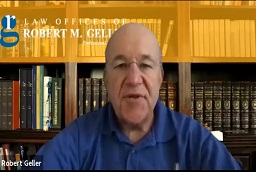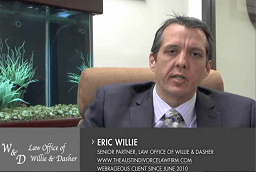Pay-per-click can be a powerful tool for your lead generation, but it can also be risky if not configured correctly. Whether you’re a solo practitioner or a marketing director of an Am Law 200 firm, mistakes in your PPC campaign can cost you hundreds to thousands of dollars in missed cases. Our aim in writing this post is to make you aware of these missteps so you can avoid problems in the future. Criminal defense advertising works only in the case of proper preparation and resources allocation so be ready to invest the right amount of time and money into it.

(Pixabay / mohamed_hassan)
Here are six common PPC mistakes lawyers make and how to avoid them:
1. Not Leveraging Negative Keywords
Negative keywords are phrases you don’t want your ads to appear for. Let’s say you have a law firm in Chicago and you are using Chicago + lawyer as a keyword. You might get a ton of clicks, but your ads could also be appearing for irrelevant search terms such as “Chicago lawyer jobs” and “salary Chicago lawyer.” How do you prevent this from happening? You add “jobs” and “salary” as negative keywords in your PPC tool. Good criminal defense marketing strategies must combine traditional best practices with contemporary digital marketing trends.
If you’re using Google Ads, you can identify what people searched for by reviewing your keywords and then clicking search terms at the top. This will display the phrases people were interested in when they clicked on your ad. Add any keywords you don’t want to appear for such as “free,” “cheap,” and “pictures” to your negative keywords list. You can add negative keywords by selecting “Keywords and Targeting” > “Keywords, Negative” and clicking “Add negative keyword” in Google Ads.
Pro Tip: When identifying irrelevant keywords, you should also ask yourself, “Are there any misspellings, synonyms, or other variations of these keywords?” If so, save yourself from wasting money by adding them as negative keywords in your campaign.
2. Sending All Leads to Your Home Page
This is arguably the worst mistake you can make. After people arrive at your home page, they need to do extra work to find the service they are looking for. Not only is that frustrating for the visitor, but search engines may penalize you for it. Obviously criminal defense attorney advertising only works well when you undertsand how your market thinks and which demographics to target.

Need Google Ads Management Help?
Free Google Ads account review for
qualified clients
Almost 20 years experience
When search engines see that your landing page isn’t hyper-relevant to your ads, they will reduce your Quality Score – which has a direct impact on your CPC. Ideally, you should choose ads and landing pages in a way that resonates with the standard user journey detailed below:
- Users search for something specific
- They click on an ad that resonates with their query
- They’re redirected to a page that has “exactly” what they’re searching for
When you send PPC traffic to your homepage, you’re dumping visitors onto the most general page on your site, so they’re unlikely to stick around and explore your business. The solution to this is to create dedicated landing pages for each ad set, and then link those pages to user intent. If users click on an advertisement about “work-related compensation,” they need to be taken to a page about work injury compensation rather than the homepage of a personal injury law firm.
Creating high-quality landing pages is an art itself, but here are a few things to consider if you want your leads to convert:
-
Offer the necessary information about your law service, including how much it usually costs.
-
Explain the benefits, telling people how your firm will help them get justice and/or compensation.
-
Build trust, showing testimonials from existing clients.
-
Make things convenient, only asking for the information you absolutely require (like their name, phone number, and email address).
-
Convince people to take action, encouraging them to book their first consultation.
3. Forgetting About Geographic Targeting
Another major mistake we frequently see in legal PPC campaigns is the absence of geographic targeting. Studies have shown that people are more likely to contact your business when you are local. Careful bidding and targeting of your keywords based on your physical location is key to improving your campaign performance. Think about it. What good is it to show your ads to people in Denver when you only practice law in Salt Lake City?
Geo-targeting lets you restrict the delivery of your ads to specific locations. You can target your ads by areas within a country, a radius around a specific location, or groups of location (which can include your business locations and places of interest). Remember, you’re charged for every click, so you want your targeting to be as precise as possible.
Pro Tip: Make sure to thoroughly check the “Advanced Search and Location Options” dropdown in Google Ads. It should allow you to define the location radius as well as learn who can see your ad. Targeting people who are only interested in your location and not actually present there is unlikely to result in conversions. Change your Settings, so your ads are only delivered to those who are in (or regularly visit) your target locations.
4. Neglecting Ad Extensions
PPC platforms like Google Ads offer a range of opportunities to make your campaigns stand out. One opportunity is to display information-rich extensions in your ads. According to Google, ad extensions are often an immediate and effective way to improve an ad’s clickthrough rate, and—bonus!—it doesn’t cost anything extra.
The most popular ad extensions include:
- Call: This inserts your phone number inside the ad, giving people a direct way to connect to your office without having to visit your Contact Us page.
- Location: The location extension shows things like your name, address, and phone number. All you have to do is connect your ad account with Google My Business. Once connected, searchers can click your address to open up your business on Google Maps.
- Sitelinks: These are essentially URLs of the related pages on your website, such as About Us, Related Services, Pricing, etc. Using sitelinks gives people a better idea of what other relevant details they can access from your site.
- Message: If you have a number for receiving texts, and if it makes sense for your law firm, the message extension allows visitors to message you directly from your ad.
- Callouts: You can use callouts to display important details like features or benefits. If you accept calls 24/7, offer New Year discounts, or have a team of certified practitioners, this is the extension you should be using.
Remember to configure your ad extensions, but don’t take the “set it and forget it” approach. Analyze, experiment, and see what extension works best.
5. Failing to Create Effective Ad Groups
Ad groups are meant to help group your ads and keywords based on specific themes. Creating a single ad group for all of your keywords is not an effective strategy and could end up costing you dollars, leads, and conversions.
We frequently come across accounts with missing or ineffective ad groups, and this is one of the biggest mistakes lawyers make when setting up their PPC ads. The solution to this is to create specific ad groups by merging similar keywords and ads into different segments.
For example, if you have a law firm that deals in both family and personal injury law, you may want to set up your ad groups and campaigns as follows:
- Family Lawyer (Campaign)
- Divorce, Maintenance, Child Custody, Alimony, Property Division (Ad Groups)
- Personal Injury Lawyer (Campaign)
- Car Accident, Slip and Fall, Worker’s Compensation, and Injuries, Disability Insurance, Mesothelioma (Ad Groups)
As you can see from the examples above, the ad groups represent different services. Make sure to use text ads and keywords that are relevant to the theme of each ad group. You can also use negative keywords in each group to ensure your ads don’t appear for irrelevant search terms.
6. Not Increasing Your Quality Score
Your Quality Score can make or break your paid advertising efforts. It’s essentially a “1-10 score” given to each of your ads based on their relevance, expected CTR, and landing page. To put it simply, the Quality Score evaluates how relevant your landing page and ad experience are to the keywords you’ve put in your ads. If your score on certain ads are low and you don’t take steps to improve it, it will negatively impact your whole account.
That means you’ll be paying a greater than usual sum for each click, and your ad impressions will reduce if you’re not careful. The best way to improve your Quality Score is to use landing pages relevant to each ad group. When it comes to the keyword match type, avoid using Broad Match as it could lead to lower relevancy to a visitor’s search term. Instead, use Modified Broad Match as it allows greater control over search terms that trigger your ads.
Using Modified Broad Match in Google Ads:
-
You just have to add a “+” sign at the beginning of a phrase to tell a search engine to only link it to searchers that feature the words in the phrase. For example, in the case of “criminal law firm,” including the + symbol between the words (criminal+law+firm) tells Google to only serve your ads for any broad terms that feature each of the three words.
Conclusion
As you’ve read through this article, you might have realized that there are a few gaps in your current PPC campaign. In a sector as competitive as law, you need to cover any gaps you can find. By avoiding these common blunders, you’ll have a significant advantage over your competitors.
If you find yourself struggling at any point, we specialize in PPC management for attorneys so contact us for help.



















